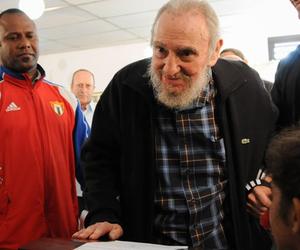Fidel Castro makes surprise appearance in Cuba
- Submitted by: lena campos
- Society
- 02 / 06 / 2013

Stooped and using a cane, Cuba's revolutionary leader Fidel Castro has taken the country by surprise by turning out to vote in legislative elections, after a three-month absence from public view.
The 86-year-old Castro cast his ballot at a school in Havana's El Vedado neighborhood on Sunday, engaging in an animated give-and-take with reporters at the polling station and voters for more than an hour.
The elections were to choose 612 members of the National Assembly as well as deputies of local legislatures, with the number of candidates equal to the number of available seats, so Castro easily stole the show.
His rare public appearances often have served to tamp down rumors about his own health, but Castro used this occasion to talk about improvements in the health of his good friend and ally Hugo Chavez, who is convalescing in Cuba.
The Venezuelan president is "much better, recovering," Castro said of the 58-year-old Chavez, who himself has not been seen or heard from since December 10, when he traveled to Havana for his fourth round of cancer surgery.
"It has been a tough struggle but he has been improving," Castro said in comments carried by the official Granma newspaper, adding: "We have to cure him. Chavez is very important for his country and for Latin America."
Castro said he gets daily reports on the health of Chavez, whose survival is also crucial to Cuba, which depends on Venezuela for cut-rate oil and trade as well as international political support.
Castro, who turned over the country's leadership to his brother Raul in 2006 after he fell ill, also took the opportunity to throw darts at the United States, his adversary of more than half a century.
"I am convinced that Cubans are really a revolutionary people," said Castro, who came to power in a 1959 revolution.
"I don't have to prove it. History has already proven it. And 50 years of the US blockade have not been -- nor will it be -- able to defeat us."
The United States slapped a commercial, economic, and financial embargo against Cuba in October 1960 after Castro's revolutionary government nationalized the properties of United States citizens and corporations.
It was broadened to become a near-total embargo in 1962 as Cuba's alliance with the Soviet bloc became apparent.
Images shown on Cuban TV as well as pictures in the newspaper Juventud Rebelde showed a slightly stooped Castro with a cane. He wore a dark shirt and a bomber jacket.
In his comments, the revolutionary leader also praised the creation of the Community of Latin American and Caribbean States (CELAC), whose presidency Cuba formally assumed last week at a summit in Santiago, Chile.
Set up in Caracas in December 2011 at the behest of Chavez, CELAC groups all nations from across the Americas except the United States and Canada.
The Cuban chairmanship of the group marked Havana's full regional reintegration and was seen as a major diplomatic coup for Communist-ruled Cuba.
"This was a step forward which we owe to the efforts of many people, including Venezuelan President Hugo Chavez," Castro said.
Castro had not been seen in public since October 21, when he accompanied Elias Jaua, who is now Venezuela's foreign minister, to the Hotel Nacional.
The Cuban leader's long absences from public view have fueled rumors that his health has worsened, that he was dead or on his death bed.
He turned over the Cuban presidency to his brother Raul in 2008 two years after falling seriously ill and undergoing intestinal surgery.
Since then, he has kept his hand in by writing frequent editorials, publishing books about the revolution, and welcoming a few international leaders in private events.
On Thursday, according to state media reports, he hosted former Brazilian president Luiz Inacio Lula Da Silva.
About 8.5 million Cubans took part in the polls that featured no opposition candidates. Authorities billed the event as a celebration of Cuban democracy, "which is different" from those in other countries.
But Cuban dissidents blasted the vote.
"What strange elections, in which there is no choice and all the candidates think the same," wrote dissident blogger Yoani Sanchez. "It's an electoral farce."
On Monday, the head of Cuba's election commission said nearly nine of 10 registered voters had gone to the polls to elect the National Assembly members, and that 94 percent of the ballots cast were valid.
Source: GlobalPost.com
Comments